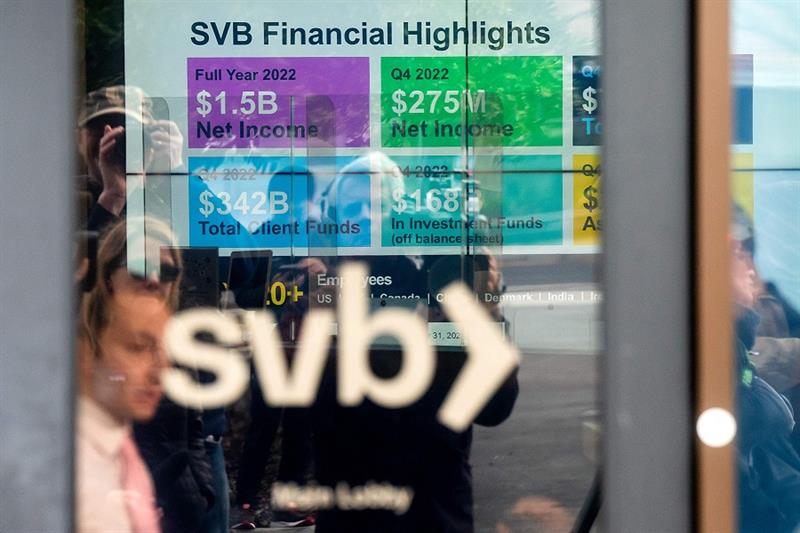
A display lists Silicon Valley Bank (SVB) achievements as customers gather to withdraw money at SVB s headquarters in Santa Clara, California, on March 13, 2023. AFP
While European stock markets mostly fell at the open on Tuesday, as investors fretted over contagion fears after the collapse of two US lenders.
The failure of Silicon Valley Bank (SVB) on Friday, followed by Signature Bank days later, has sent shockwaves across trading floors worldwide, as US authorities scrambled to provide some reassurance to investors while pledging support for other lenders and depositors over fears of a bank run by customers.
However, shares in several US banks were quickly hammered after the closures, despite US President Joe Biden giving assurances that the nation's banking system was sound, while European leaders similarly tried to soothe investors.
The collapse of SVB, which specialised in venture-capital financing mainly in the tech sector, was largely the result of the Fed's sharp interest rate hikes aimed at quelling inflation, which hit securities hard.
Bloomberg News reported that about $465 billion had been wiped off the market value of global financial stocks in three days.
Now several commentators and leading banks say the Fed might need to pause its tightening campaign to provide some stability to financial markets -- with some even suggesting it could cut borrowing costs.
"SVB's demise will pressure central banks into slowing interest rate hikes," said Arun Sai, of Pictet Asset Management.
"Central banks will now have to consider the impact of any further interest rate hikes on the stability of the financial system" Sai added.
"Measures by authorities have so far prevented a US bank run on deposits but have not been enough to avert a bank run by investors," said National Australia Bank's Rodrigo Catril.
"The risk of a financial crisis remains elevated, and investors have rushed to reduce their exposure to the sector."
Stephen Innes of SPI Asset Management added that the selling came despite non-US banks having little exposure to the firms in trouble and with global financial systems flush with cash.
"US financial stress could lead banks of all stripes to retrench lending to the real economy and tighten broader financial conditions, amplifying risk to the broader markets," he said.
"And a lower rates environment would likely hit worldwide banks' profits."
Investors are now nervously awaiting the release of US consumer inflation figures this week, with a forecast-beating figure meaning a huge headache for the Fed in light of the SVB crisis.
In light of the banking crisis, oil sank more than one percent, having tumbled Monday, as traders grow concerned about the demand outlook caused by a possible recession.
Yields on government bonds around the world have tumbled in light of the crisis, and analysts warn the risk of recession has grown.
"Global bond markets are suggesting a global economic slowdown, which is not great for Asia," said John Vail of Nikko Asset Management.
This comes as "bank shares globally continued to feel the reverberations from the fallout from the Silicon Valley Bank issue, with general sentiment weakening as a result," said Richard Hunter, head of markets at Interactive Investor.
London's benchmark FTSE 100 index fell 0.6 percent to 7,503.85 points compared with Monday's close.
HSBC topped the fallers board, sliding 2.5 percent one day after it agreed to buy SVB's UK division.
In the eurozone, the Paris CAC 40 index retreated 0.2 percent to 7,001.31, with Credit Agricole dipping 1.4 percent in value.
Frankfurt's DAX, however, rose nearly 0.1 percent to 14,968.48, but Commerzbank dipped 0.8 percent.
While equity markets were well in the red in Asian trade Tuesday, with Tokyo, Hong Kong and Seoul more than two percent down, while Sydney, Taipei, Manila, Jakarta and Bangkok all shed more than one percent.
Short link: